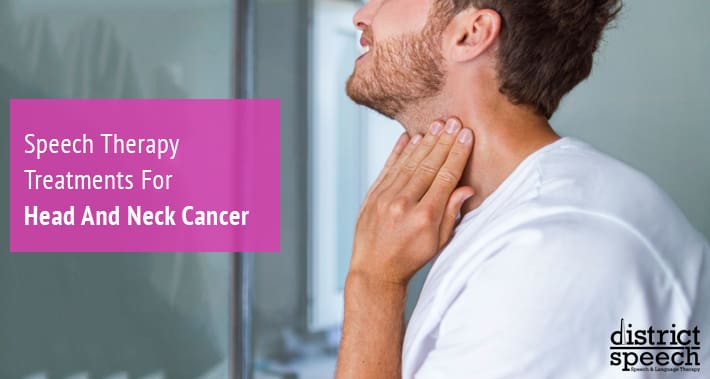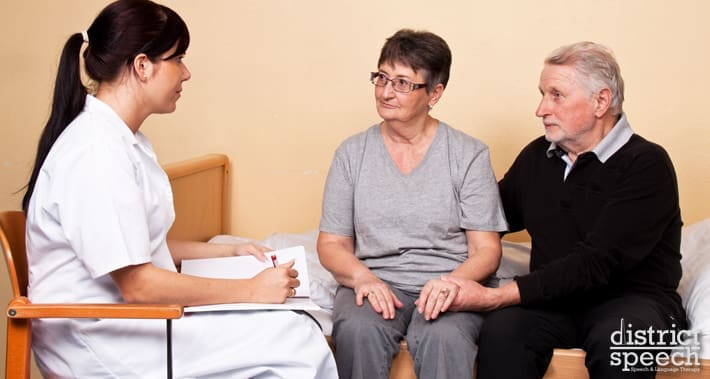
Some types of cancer seem to get more attention than others.
For instance, you’d be hard pressed these days to find someone who doesn’t know that October is breast cancer awareness month or that November has been rebranded by some groups as “Movember”, during which people grow mustaches to raise money for prostate cancer.
And we’ve all heard the warnings to wear sunscreen to avoid skin cancer, and not to take up smoking, lest one develop lung cancer.
Some types of cancer, however, don’t get as much attention.
As a speech therapist for adults who provides services for individuals who have experienced head and neck cancer, today we’re going to shed some light on this lesser known group of cancers.
Keep reading to learn more.
What Is Head And Neck Cancer?
Head and neck cancer (HNC) is a general term used to describe malignant tumors which originate in the following areas:
- Salivary glands
- Larynx (voice box)
- Pharynx (throat)
- Oral cavity
- Nasal cavity
- Paranasal sinuses
Although the brain, eyes, thyroid, and esophagus are part of the head and neck, cancers in these areas are not counted in the group known as head and neck cancers.
Speech Related Symptoms Of Head And Neck Cancer
There are a number of symptoms of head and neck cancer, but for today we’re going to focus on the ones which affect speech and vocalization.
Some symptoms which affect the voice include:
- Changes in vocal loudness, quality, and pitch, also known as dysphonia, due to tumors of the larynx
- Loss of voice post surgery
- Resonance disorders, including hypernasality, hyponasality, and cul de sac resonance
Symptoms which affect speech can include:
- Distorting lingual phonemes
- Errors of articulation (for instance omitting or substituting words)
- Imprecise speech
What Causes Head And Neck Cancer?
Some factors which have been identified as causes of head and neck cancers include:
- Tobacco use, including those which are smokeless
- Certain viruses, including Epstein Barr and HPV
- Excessive alcohol use
Additionally, there are a variety of factors which have been shown to increase the risk of developing head and neck cancers.
These include:
- Poor oral and dental hygiene
- Nutritional deficiencies
- Excessive exposure to the sun
- Exposure to occupational inhalants, including asbestos and wood dust
- Chewing on betel nuts – a nut which grows in some parts of Asia and has stimulant effects similar to those of tobacco or caffeine
- GERD (gastroesophageal reflux disease)
- Poor immune system due to underlying conditions or certain medications
- Use of recreational drugs, including cannabis
- Radiation exposure
- Genetic factors and family history

How Can Speech Therapy For Head And Neck Cancer Help?
If you’re experiencing speech issues, a speech therapist can help you through all phases, including screening, diagnosis, and treatment of this condition.
Roles of the speech therapist may include:
- Performing assessments of speech, language and feeding and swallowing issues which could indicate head and neck cancers
- Preparing treatment plans tailored to the needs of their patients
- Providing counselling for those who have special needs related to their head and neck cancer, and their families
Treatment methods for issues related to head and neck cancers should take into account factors such as your social context, age and education, and cultural and linguistic background.
Speech therapists will also work together with other medical professionals while making decisions which affect treatment and recovery goals.
Some treatment options which may be used can include but aren’t strictly limited to:
- Alaryngeal speech: Alaryngeal speech is a method which focuses on helping individuals produce speech from an area other than the larynx, including the esophagus, or a tracheoesophageal prosthesis
- Exercise training: Using exercises to improve the range of motion and strength of muscles needed for speech
- Alternative and Augmentative Communication: Devices such as signs, picture boards, signs, and finger spelling
- Voice therapy
- Treatments to help manage swallowing disorders which may accompany head and neck cancers
- Audiologic management for those whose cancer has affected their ears, resulting in hearing loss, tinnitus, and balance issues
- Counselling, not just to the individual but also to family, caregivers, and other significant people in the patient’s life
Book Your Appointment With District Speech Today
A cancer diagnosis can be a scary thing, but you don’t have to go through it alone.
If you’ve been diagnosed with head and neck cancer, and are worried about the effect it could have on your speech, and your ability to communicate with your friends and loved ones, there is help available.
We’re District Speech, and we have speech-language pathologists in Washington, and DC area, and we can help you navigate this scary time.
Schedule your appointment with one of our licensed speech pathologists today.
1300 I St NW, Suite 400 E,
Washington, DC 20005
- https://g.page/districtspeech
District Speech and Language Therapy specializes in speech therapy, physical therapy, and occupational therapy solutions, for both children and adults, in the Washington D.C and the Arlington Virginia areas.